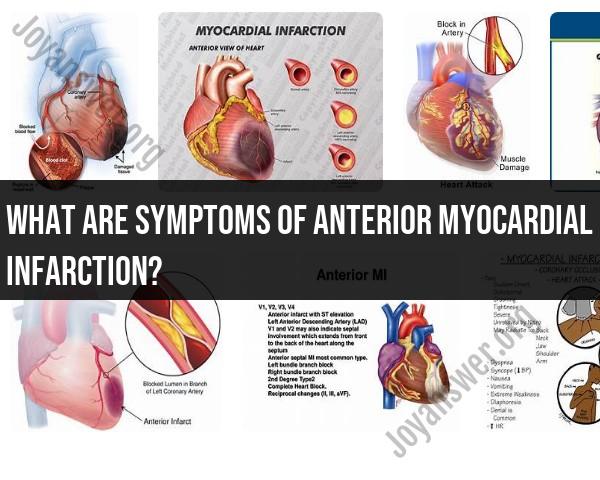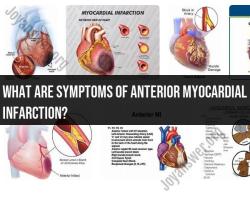What are symptoms of anterior myocardial infarction?
Anterior myocardial infarction, also known as anterior heart attack, occurs when there is a lack of blood flow to the front part of the heart. This can be a life-threatening condition, and it is important to recognize the symptoms and seek immediate medical attention. Common symptoms of anterior myocardial infarction can include:
Chest Pain: This is the most common symptom of a heart attack. The pain is often described as a crushing, squeezing, or heavy feeling in the chest. In the case of anterior myocardial infarction, the pain typically occurs in the center or left side of the chest and may radiate to the left arm, jaw, neck, or shoulder.
Shortness of Breath: Difficulty breathing or shortness of breath can be a prominent symptom, particularly if the heart's ability to pump blood is significantly affected.
Nausea and Vomiting: Some individuals may experience nausea and may even vomit as a result of the intense chest pain and stress on the body.
Sweating: Profuse sweating, often described as "breaking out in a cold sweat," can be a symptom of a heart attack.
Dizziness or Lightheadedness: Feeling dizzy or lightheaded may occur as a result of reduced blood flow to the brain.
Fatigue: Unusual and extreme tiredness, sometimes lasting for several days leading up to the heart attack, can be a warning sign.
Pain in the Upper Abdomen or Epigastric Region: Some people may experience pain or discomfort in the upper abdomen, which can be mistaken for indigestion.
Anxiety or a Sense of Impending Doom: A feeling of extreme anxiety or a sense that something is terribly wrong can be a sign of a heart attack.
It's important to note that the presentation of symptoms can vary from person to person. Some individuals may experience only mild discomfort, while others may have severe chest pain. Additionally, some people, particularly women and older adults, may have atypical symptoms that are not primarily focused on chest pain.
If you or someone you are with is experiencing symptoms that may indicate anterior myocardial infarction, it is crucial to seek immediate medical attention by calling emergency services (911 in the United States) or going to the nearest hospital. Timely intervention is critical to prevent further damage to the heart and to improve the chances of a positive outcome.
What are the common symptoms and indicators of anterior myocardial infarction (heart attack)?
The most common symptom of an anterior myocardial infarction (AMI), or heart attack, is chest pain. The pain is often described as a squeezing, pressure, or fullness in the chest. It may radiate to the back, jaw, neck, or arms. Other symptoms of an AMI may include:
- Shortness of breath
- Nausea
- Vomiting
- Sweating
- Lightheadedness
- Anxiety
- Palpitations
- Fatigue
- Weakness
How to recognize and interpret the signs of an anterior myocardial infarction?
The signs of an AMI can be difficult to recognize, as they can be similar to the symptoms of other conditions, such as indigestion, anxiety, or the flu. However, there are some key signs and symptoms that should not be ignored, especially if they occur in combination.
The most important sign of an AMI is chest pain that is new or different from previous chest pain. The pain is often described as a squeezing, pressure, or fullness in the chest. It may radiate to the back, jaw, neck, or arms. The pain may be accompanied by other symptoms, such as shortness of breath, nausea, vomiting, sweating, lightheadedness, anxiety, palpitations, fatigue, or weakness.
If you are experiencing any of these symptoms, it is important to seek medical attention immediately.
What immediate actions should be taken in the presence of anterior MI symptoms?
If you are experiencing any of the symptoms of an AMI, it is important to seek medical attention immediately. The sooner you receive treatment, the better your chances of a full recovery.
Here are some immediate actions you can take:
- Call 911 or your local emergency number.
- Sit or lie down in a comfortable position.
- Loosen any tight clothing.
- Aspirin, unless you are allergic to it.
- Take your medications as prescribed by your doctor.
Do not drive yourself to the hospital. Wait for an ambulance to arrive so that you can receive medical attention on the way.
Once you arrive at the hospital, you will be evaluated by a healthcare team. They will perform tests to determine if you are having an AMI and to assess the damage to your heart. You may be given medications to dissolve blood clots, open up blocked arteries, and reduce the risk of complications. You may also need to undergo surgery to bypass blocked arteries.
With prompt medical attention, most people who have an AMI make a full recovery.


